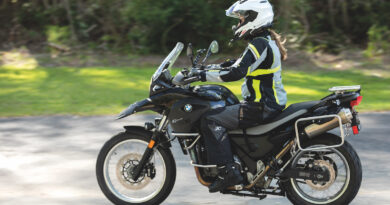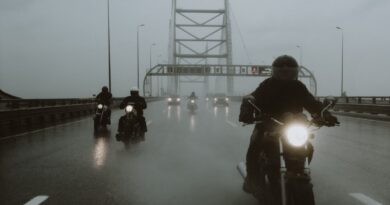The call of the open road (redux)

Back in 2002, I wrote a column for Motorcycle Consumer News entitled “The Call of the Open Road,” which I rediscovered after starting to write something very similar and having a sense of déjà vu. I dug back through my files and found I’d already said much of what I had in mind. Funny how some things don’t change much over time. Perhaps the topics in my head complete their orbits about every 20 years. I’ve reproduced that article here with some annotations. If you want to maintain the flow of the original piece, just skip the italicized paragraphs and return to them later.
I’ve been itching for a long motorcycle trip lately. When I’ve mentioned that to some folks around me (a few motorcyclists included), they’re perplexed. Not particularly with regard to why I’d go on a bike, but why I’d take the time to ride/drive anything cross-country. There are more efficient means of travel than going over-the-road, if getting to the destination is really what’s important. There are more effective ways to fully escape from the responsibilities of life, if achieving such relief as completely as possible is actually the goal. Yet there is something irresistibly compelling – at least for some of us – about driving (this is actually not particular to motorcycles, so I’m going to use this word instead of “riding”) where we want to go, even when it requires enormous commitments of time and effort, and includes the risk of serious and unpredictable frustrations. So what’s the big deal?
Stop right there, 19-year-younger Me! What ways to fully escape the responsibilities of life are more effective than riding? I was going to title the new article on this topic “R&R,” using this as a sort of double entendre. Not only does it mean “Remove and Replace” on your motorcycle repair bill, but also “Rest and Relaxation” in military parlance. With the wisdom accrued over nearly two additional decades of life experience, I’ve come to believe complete extraction from the world of everyday demands is the best way to achieve genuine recuperation. Only then can we return to our daily routine thoroughly refreshed and restored. True, there are ways other than riding to accomplish this (meditation, an engrossing movie or book, fishing, golfing, etc.), but I can’t think of anything both as pleasurable and as effective at displacing other preoccupations as riding – at least riding well, with the focused attention that involves. Driving doesn’t even come close; give me a break!

Let’s start with this issue of efficiency. People who don’t love driving ask why anyone would want to “waste” all that time getting there when we could fly and be there more quickly, presumably to start the enjoyment sooner, and then allow the fun to last longer at the tail end of the trip, zipping back home through the sky at something more like the last minute. To this I answer that they’re the ones wasting time. Instead of enduring the boredom and hassles (and vulnerability to others’ delay-making errors) of air travel at both ends of my journey so I can “begin” the pleasure earlier and hold onto it longer, my enjoyment begins the moment I leave my driveway, and it doesn’t stop until I pull back into my garage. In fact, the trip’s fun actually starts even earlier than that, as I’m tending to the preparation of my bike a week or two before my departure. Factor in the possibility that the travel we’re talking about isn’t vacation time, and the ride there and back could be the only fun involved; I’ve certainly had work trips like that, and I’m sure I’m not the only one.
 See? You started out talking about driving, but gravitated toward riding references. Need I remind you of all the vacations you’ve taken and hated droning along the interstate for hours on end in your car? I know you’re intent on pointing out some commonalities between driving and riding, so I won’t keep harping on this, since I also know you realize overlap isn’t the same as equivalence.
See? You started out talking about driving, but gravitated toward riding references. Need I remind you of all the vacations you’ve taken and hated droning along the interstate for hours on end in your car? I know you’re intent on pointing out some commonalities between driving and riding, so I won’t keep harping on this, since I also know you realize overlap isn’t the same as equivalence.
The definition of efficiency depends on the context. If you love driving, it’s more efficient in terms of fun-units-per-minute than having someone else take you there by plane or train or anything else you’re not controlling – which brings up the next item for discussion. Part of the satisfaction of driving is having maximum control. I decide what route I’ll take. I decide when to stop for fuel and snacks, for a look at the scenery, for a real meal, and for the night. I decide how much luggage I take, which music to play, what temperature range to wait for before departing. The list goes on.
My point is that driving allows for autonomy. Not only is autonomy inherently appealing – we all want to do what we want to do, when we want to do it, right? – but it can also stand in stark contrast to the grinding confinement of everyday life, wherein our ability to make unilateral choices is often confined to a pretty tiny corner of existence. Driving, even when it’s just a matter of commuting or running an errand, provides a partial break from this sensation of captivity. Deliberate movement through space defies in a concrete way the abstract mental walls that hem us in; that’s why simply taking a walk can be such an effective means of attitude self-adjustment.

Unless we’re teenagers, autonomy isn’t only about breaking free of the constraints of routine expectations. It’s also about taking responsibility for ourselves. When that challenge is accepted willingly, we call that experience adventure. Long-distance driving can be a treacherous ordeal, and requires planning, foresight, skill, judgment, patience along with a host of other actions and attributes. Discipline and perseverance are often needed in order to avoid disaster, or to recover from a setback. How does this voluntary exposure to difficulty and demand figure in with that talk about “fun” a little while ago? It’s the same category of pleasure we feel in competing with an opponent in a game, or perfecting our technique on the grill. While there is a period of discomfort at the outset, when our fate is uncertain and or adequacy is unproven, the process of surmounting the obstacles in our path provides a sense of satisfaction that outweighs the anxiety involved. In fact, as skill and confidence accrue, the anticipation of that satisfaction can turn the initial anxiety into something more like excitement – roadside repairs become a chance to take on the ethereal foe of Chance and defeat him! One of the most enjoyable rides I ever took was through a hurricane that required an additional two nights on the road; the struggle to make headway (slowly and safely, but also surely) in spite of the weather felt like an adventure of epic proportions.
Ah, yes, that trip up the Blue Ridge Parkway with Hurricane Opal chasing us down remains one of my most memorable rides. Samuel Johnson said, “When a man knows he is to be hanged in a fortnight, it concentrates his mind wonderfully.” While I don’t relish fearing for my life, knowing my life is at stake banishes all extraneous concerns from consciousness. Another example of such an exhilarating demand from my riding history was a dual-sport trip through the wilds of southern Colorado, which included harrowing, boulder-strewn cliff-side trails. These required maintaining enough momentum to surmount the constant parade of obstacles, alongside adequate control to avoid hurling oneself into the immediately adjacent abyss. I assure you, all thoughts of lawn care, bookkeeping, overdue birthday presents, and maximizing SEP contributions were nowhere to be found. This same principle applies to a “mundane” commute through traffic; given the risks inherent in riding, it’s anything but mundane and can clear off the desktop of attention twice daily. Such clearing is an essential part of rebooting our mental circuits.
 Adventure is about discovery and surprise. That can involve the potentially frustrating whims of nature, road conditions and mechanical failure, as well as unexpected delights and windfall opportunities; a stunningly gorgeous vista opens up around the next curve, a whole new set of friends gets made at a rally. No matter what, the driver is thrust into unfamiliar situations that require mental flexibility. This is a big part of what makes travel re-creation. Our minds tend to calcify and grow numb in the ruts of day-to-day repetition. Variety is more than the spice of life; it’s an essential nutrient. Without discovery, we grow weary, restless and incompetent. Experiencing new things frees us up to experience old things in new ways. Creative problem-solving requires regular exploration away from the problem at hand. Those who can’t leave a problem until they’ve solved it may be working a lot longer and harder – and come to a far less effective solution (if they come to one at all) – compared to folks who can walk away from one challenge, learn some new tricks in dealing with another, and then take that fresh perspective back with them when they return to the first. The more diverse a person’s experiences, the wider range of challenges they’ve faced and learned from, the better their set of tools for dealing with whatever comes up in the future.
Adventure is about discovery and surprise. That can involve the potentially frustrating whims of nature, road conditions and mechanical failure, as well as unexpected delights and windfall opportunities; a stunningly gorgeous vista opens up around the next curve, a whole new set of friends gets made at a rally. No matter what, the driver is thrust into unfamiliar situations that require mental flexibility. This is a big part of what makes travel re-creation. Our minds tend to calcify and grow numb in the ruts of day-to-day repetition. Variety is more than the spice of life; it’s an essential nutrient. Without discovery, we grow weary, restless and incompetent. Experiencing new things frees us up to experience old things in new ways. Creative problem-solving requires regular exploration away from the problem at hand. Those who can’t leave a problem until they’ve solved it may be working a lot longer and harder – and come to a far less effective solution (if they come to one at all) – compared to folks who can walk away from one challenge, learn some new tricks in dealing with another, and then take that fresh perspective back with them when they return to the first. The more diverse a person’s experiences, the wider range of challenges they’ve faced and learned from, the better their set of tools for dealing with whatever comes up in the future.
A good workout regimen doesn’t involve exercising just one muscle group. Nor does it include only strength training, only stretching, or only aerobic conditioning. In addition to these, it would also feature dietary and lifestyle guides (e.g., getting enough sleep, balancing work and play, maintaining relationships), since these are all interwoven elements of health. Most distinctions between body and mind in such matters are artificial. We can favor a myopic focus on whatever is causing us the most anxiety, but this is rarely the best strategy for addressing it. A more holistic approach is apt to yield superior, longer-lasting results. Riding activates parts of our psyche that often languish elsewhere, yet have wide-ranging application. Think how often a motorcycle-related experience provided a template for dealing with a seemingly unrelated situation.

The pursuit of discovery can expand our horizons, literally and figuratively. It provides a contrast, allows for the emergence of multiplies perspectives, and extracts us from ruts and routines. But sometimes the change we seek is not a matter of discovery, but rather re-discovery. Travel can be about confirmation of something we feared was lost, it can mean reconnecting with people, places and memories. While it’s a change from our present situation, it’s also an attempt to recapture something we once knew and want to know again. In repeating something from the past, we experience ourselves as we were then, too – along with all the layers of who we’ve been between then and now. It provides us with a sense of personal coherence and stability.
There are many ways to slice the pie of human motivation. One cross-section reveals the opposing poles of adventure and security. At one extreme of this dichotomy, we seek excitement, take initiative, explore and create. At the other extreme, we seek serenity, embed ourselves in the comforts of familiarity, relax and receive. Driving can be employed in the service of both. It can even happen simultaneously. What about the reassurance of feeling dry and warm in the midst of a storm, courtesy of your trusty old rain gear, as you approach the entrance to a national park you’ve never seen before? Or how about opening your kit in the middle of nowhere, remembering the times in the past when that well-chosen selection of tools proved capable of getting you back on your way?
Driving is a many-splendored thing, and riding is its ultimate form. The open road makes it possible. So get on with it – don’t waste any time!
I couldn’t have said it better if I’d said it myself.
Dr. Barnes is a clinical psychologist in private practice in Knoxville, Tennessee, and the author of Why We Ride, a book exploring all there is to love about motorcycling.





Wonderful article! You have verbalized precisely why I ride and or drive wherever I can. I dislike everything about commercial flying somewhere. Driving from Northwest Georgia to Pennsylvania (home) 2 or sometimes more often every year for 25+ years instead of flying.
My family constantly whining “why dont we fly Dad, this is such a long drive, …….”. Hey, lets stop by Monticello and see what Thomas Jefferson was about? Hey, this place is called Seneca Rocks, pretty cool place . Hey kids lets see Hawk Mountain… wow Dad, never knew there were so many different kinds of hawks Dad. Hey kids lets see some cool mototrcycles, This is called Wheels Through Time kids, wow Dad these old bikes all still run? Thanks Dave W . for starting and riding that old H-D in the museum for my son and I.
And on ….and on…….
I loved your book Mark. Hopefully I’ll see you in Great Falls, MT in June.